- Home
- Susan Beth Pfeffer
Getting Even Page 2
Getting Even Read online
Page 2
“Slow down,” Annie said. “They posted the editors for the year?”
Lisa nodded.
Annie stared down at her sandwich. It was inconceivable there should be any problem there. Mrs. King was the advisor for the Bulletin, and she and Annie had always worked well together. Annie had been assistant editor the year before, and that job always led to editor. And even if none of that was true, Annie was the only person at the school who had genuine professional experience editing. Sure, she hadn’t done much at Image, but she’d done enough to show she was head and shoulders above anybody else at her school.
So Lisa must simply think Annie wanted someone else to be her assistant. And frankly, Annie didn’t care. So she smiled at Lisa and said, “That’s great. I was wondering when Mrs. King was going to get around to it. When’s our first meeting?”
“Today, after school,” Lisa replied.
“I love it when they give us warning,” Annie said. “Well, my calendar’s empty these days, so I should be able to make it.”
“It’s a meeting just for the editors,” Lisa said, her voice shaking.
“Right,” Annie said. “I can make it.”
“You don’t have to,” Lisa said.
“No, it’s okay,” Annie said. “I don’t have anything else planned for this afternoon.”
“You’re not features editor,” Lisa said. “I am.”
“What?” Annie said, as she choked on a bite of her sandwich. “You?”
“They named me,” Lisa said. “Mrs. King named me. I’m the editor.”
“But you said you were looking forward to working with me,” Annie said, pushing her sandwich away. “You did say that, didn’t you? I didn’t make that up.”
“You’re the assistant editor,” Lisa replied.
“No, that can’t be,” Annie said. “I was assistant last year. This year, I get promoted. That’s how they always do it.”
“I’m sorry,” Lisa said, and Annie could see she truly was. “I told you, I didn’t ask for it to be this way. But they named me editor, and they gave me two assistants. You and Doug Stevens. He’s a junior.”
“I know Doug,” Annie replied. “I worked with him last year. He’ll be very good. They don’t need two assistant editors. Why the hell did they appoint two assistants?”
“I don’t know,” Lisa said. “Annie, I thought you knew. At least I hoped you knew. I didn’t want to be the one to tell you.”
“I don’t blame you,” Annie said. “For not wanting to tell me, I mean. Or for being appointed. I don’t blame you for anything. I just don’t understand.”
“Neither do I,” Lisa admitted. “I always assumed you’d get the job. Everybody assumed that.”
“I’ll talk to Mrs. King,” Annie said. “Maybe there was some kind of mistake. Not about appointing you, Lisa. About not appointing me.”
“I understand,” Lisa said, although Annie couldn’t see how she possibly could. Annie didn’t understand a thing, except that she never wanted to eat again. They should only see her at Image, she thought. Pushing her food away. It would gladden their hearts.
The afternoon moved in slow motion. Annie pretended to pay attention to her teachers, but fortunately she wasn’t called on to prove that she had indeed been listening. If she appeared distracted, people seemed to assume she had her mind on her television appearance. Or at least Annie hoped that was what people were thinking.
Eventually the final bell rang, and Annie was free to talk to Mrs. King. She didn’t know what she should say, or even what she wanted to say, but she knew she had to find out what was going on. She tried to calm herself, as she walked into Mrs. King’s classroom, but she was shaking with tension. It was even worse than waiting to be interviewed that morning.
“Mrs. King, are you busy?” she managed to ask.
Mrs. King looked up from her desk. “Hello, Annie,” she said, and she smiled. “I’m not surprised by this visit.”
“I found out at lunch today that I wasn’t appointed editor,” Annie said.
“You were appointed assistant editor,” Mrs. King replied. “That’s not exactly the same thing as not being appointed editor.”
“I don’t understand,” Annie said. “You told me last spring that I could count on the editorship this year.”
“Oh, I’m sure I didn’t say that,” Mrs. King declared. “I never make promises like that. There are too many chances that they might be broken.”
“If you didn’t say it in so many words, you certainly led me to believe it,” Annie said, choosing her words carefully. “The assistant editor is just about always picked for the editorship the next year.”
Mrs. King smiled again. “I’m afraid you’re the exception that proves the rule,” she said. “Annie, I truly am sorry. But we decided that this was the decision that was best for the paper and the school.”
“Why?” Annie asked. “I’m a good editor. I was good last year, and this year I should be even better, because of my experience at Image. There’s a lot I could teach the other kids. I could make the Bulletin the best it’s ever been. Really I could.”
“Oh, Annie, I’m sure you could,” Mrs. King said. “Please don’t think of this decision as in any way reflecting on your abilities.”
This time Annie smiled. “It’s hard for me not to,” she replied. “You must see that.”
“Let me be frank with you,” Mrs. King said. “The problem is your Image internship.”
“How?” Annie asked. “Image isn’t a porno magazine. I didn’t do anything dishonest.” She had a fleeting image of Ashley, and sensed for a moment how she must have felt being kicked out of what she felt was her rightful place.
Mrs. King sighed. “You know what a good newspaper the Bulletin is,” she said. “And over the past two years, your work has certainly helped it become better and better. You’re a naturally gifted editor, Annie. Well, you must know that. You wouldn’t have been picked for the Image internship if you weren’t gifted.”
“Right,” Annie said. “So I’m gifted and the Bulletin is good. What’s the problem?”
“The problem is that the school enters the Bulletin in several different contests every year,” Mrs. King replied. “You remember. Two years ago, we came in third in one national contest, and last year we were second among Massachusets school papers.”
“With me editing, we’d be number one this year,” Annie said.
“With you editing, we might be disqualified,” Mrs. King said. “At least that’s the concern. You’ve been paid for your services as an editor. And the contests are very strict about their rules concerning amateurism. We know for a fact we’d be unable to enter at least two major contests, and we’re worried that we might not be allowed in one other.”
“Good grief,” Annie said. “You mean I’m out of a job because I’m overqualified?”
Mrs. King laughed. “That’s one way of looking at it,” she said. “I’m glad you’re being such a good sport about this, Annie.”
“Sure,” Annie said. She was always a good sport. Good sport, and reliable, and you could count on her never to make a fuss. Good old Annie Powell. “But aren’t you worried about losing your eligibility if I’m assistant editor?”
“I don’t think so,” Mrs. King said. “Besides, I insisted we offer you something. We owe you that.”
“You don’t owe me anything,” Annie said. “I don’t need your tokens. I’ll just turn down the assistant editorship, and then you won’t have to worry.”
“Please don’t feel you have to,” Mrs. King said. “We’d like to have you working on the paper, Annie. Even if it is just as assistant.”
“No thank you,” Annie replied. “You have Doug already. You certainly don’t need two assistants, and it really isn’t fair to either Doug or Lisa to have me around. I just won’t have anything to do with the Bulletin this year.”
“Annie, I am sorry,” Mrs. King said. “Do you have some other activity to keep you busy? Did you apply f
or one of the yearbook editorships?”
Annie shook her head. “I was keeping myself free for the Bulletin,” she replied.
“Oh, Annie,” Mrs. King said. “I wish there was something I could do.”
“There’s nothing,” Annie replied, and managed to work a smile onto her face. “Look, it’s just one of those things. There’s no malice involved, I know that, and to be perfectly honest, I’d probably have been a little bit bored working on the paper. It’s kind of below me now, I suppose.”
“Fine, Annie,” Mrs. King said. “Look, I hate to rush you, but the editors are coming in for a meeting, and I’m sure they wanted to wait until we were through before they started.”
“They’re welcome to come,” Annie said. “And put their lousy paper together without me.”
“I wish you wouldn’t take it this way,” Mrs. King said. “I’d like all your memories of the Bulletin to be happy ones.”
“They couldn’t be happier,” Annie assured her, and ran out of the classroom. She bumped into Lisa on her way out, but didn’t bother to apologize. She just wasn’t in the mood to be forgiven.
She got her bike and rode home as fast as she could. At first she was afraid she’d start crying, but then she realized she was too angry to cry. What a lousy system. When she got the Image internship, she’d been fussed over at school as if she was the crown princess of the universe. The principal had told her that her achievement reflected on the rest of them. And Mrs. King had said that working at Image would make Annie an even better editor than they already assumed she would be. Not that she’d been promised the editorship. Oh, no. Nothing as breakable as that.
And now she had nothing. No glory, no editorship, no nothing. It was all so blazingly unfair. She was being punished for being the best in her field. No wonder she didn’t feel like crying. Killing was a much more reasonable alternative.
“Hi, dear,” her mother said, as Annie stormed into the house. “Aren’t you going to say hello?”
“Hello,” Annie muttered. “I’m going to call Robin.”
“No you’re not,” her mother said. “Not until after five at any rate. Now tell me all about the TV appearance.”
“It’s canceled until next week. I have to talk to Robin right now!” Annie shouted.
“Don’t use that tone of voice with me,” Annie’s mother said. “So the show was canceled. Why are you so desperate to talk to Robin?”
“This has just been the lousiest day of my life,” Annie said. “And only Robin would understand.”
“Try me,” her mother replied.
Annie sat down in the livingroom, next to her mother. She did have great parents, and they were understanding about practically everything. It was certainly worth it to give her mother a try.
“First of all, I didn’t get to be on the TV show,” she began.
“What happened?” her mother said.
“I got bumped for the head of the nurses’ union,” Annie said. “Stacy somebody or another said she’d call you to see if I could skip another morning of school, so I could be on next week.”
“Your father and I will have to discuss it,” her mother said.
“I knew you’d say no,” Annie declared, “I just knew it.”
“I didn’t say no,” her mother replied. “Boy, you are in a mood. It can’t just be because you weren’t on TV.”
“Why not?” Annie challenged her. “Why wouldn’t that be enough?”
“Because you’re too smart for that sort of thing to bother you so much,” her mother replied. “And you certainly wouldn’t be rushing to the telephone to call Robin up long distance just to tell her you’d been preempted. So what’s really bothering you?”
“I was supposed to be features editor,” Annie said. “Of the Bulletin. You know that, Mom. I’ve been counting on it since last spring.”
“Of course,” her mother said. “What happened? They didn’t name you?”
“They sure didn’t,” Annie replied. “They gave me assistant editorship instead, but I turned it down.”
“I don’t understand,” her mother said. “Did you speak to Mrs. King? Did she give you an explanation?”
“They say now I’m a professional editor,” Annie declared angrily. “And they don’t want to lose their precious amateur status. They’re afraid my being features editor on the Bulletin staff would jeopardize their chances of winning some precious award. So instead they offered me the assistant editor’s job, because they knew I’d turn it down. I wasn’t even the only assistant editor. They named a junior too, and he would have really had the job. They just tossed me a lousy bone. Well, I tossed it right back at them. Believe me, I let Mrs. King know just what I thought of her dumb newspaper.”
“Oh, Annie,” her mother said. “I can understand why you’re so upset, but I hope you didn’t say anything foolish.”
“Foolish?” Annie asked. “Me foolish? Why would you think that?”
“It doesn’t matter what I think,” her mother said. “What matters is what Mrs. King thinks. You were counting on her for a faculty recommendation on your college applications.”
“I don’t care about college!” Annie cried. “Not now. Why does everything have to be about college? The Image internship would look great on my applications. The editorship would show I’m well rounded. My grades have to be in the nineties, better still the high nineties. I’d better get a combined fifteen hundred on my SATs. Everything is for college. What do I care about college?”
“You know perfectly well you care about college,” her mother replied. “And you know how important it is that you do well academically. So if you want the education that, frankly, you’re entitled to, in my opinion, you’re going to have to work very hard straight through high school. And that includes not saying anything foolish to people like Mrs. King. Oh, well. I suppose if you said anything really horrible to her you can apologize tomorrow.”
“I’m not about to apologize,” Annie replied. “I’m not about to apologize for anything. Mom, if I’ve blown my chances to go to college, then I just won’t go. I’ll get a job. I’ll work in a supermarket. That’s what Torey does. She works as a cashier, and if it’s good enough for her it’s good enough for me.”
“It certainly isn’t good enough for you,” Annie’s mother declared. “And you know it. I doubt that Torey’s crazy about it either. Now go upstairs, and write Robin a nice long letter telling her how unjust the world is, and maybe you’ll cool off a little. I don’t want your father to see you like this. He’ll start worrying, and then the two of you will get into a fight, and tonight will just end up being a misery for all of us.”
“You don’t understand,” Annie said. “You really don’t understand. I don’t want to cool off. I’ve been wronged. I’m right to be angry”
“Fine,” her mother said. “Enjoy being righteously indignant. Let it poison your entire school year if you really want. You’re the only one who’s going to suffer. You’ll be punishing yourself a lot more than you’ll be punishing anybody else.”
“That sounds perfect,” Annie declared. “Why shouldn’t I punish myself? Everybody else enjoys doing it to me.”
“I’m going to get back to my book,” her mother said. “When your sense of humor returns to you, let me know. I’d love to hold a civilized conversation with you again.”
“Don’t count on it,” Annie said, but her mother had already opened the book, and made a big point of giving it her full attention.
There was no point staying home, if she couldn’t call Robin, Annie decided. She grabbed her jacket from the coatrack and ran out the door. Somewhere there had to be a place she could escape to, someplace where who she was didn’t matter, not to them, not to anybody, not even to herself.
Chapter 3
For Annie, bookstores were what candy stores were to other people. Not that she had any objections to candy. But in times of stress, she sought relaxation in the smells and feel of a bookstore.
T
here was certainly no shortage of bookstores in her town. Annie was still angry enough at her mother and the universe to choose the store her parents liked least, one that favored the biggest best sellers, and had next to nothing of the obscure novels and philosophy texts her parents enjoyed. It was a small act of rebellion, but all the big acts were just a little too scary and tempting for Annie to choose them.
She strode in feeling a new sense of purpose. She would buy a book, she decided, something her parents wouldn’t approve of.
That limited the list considerably, because her parents approved of almost anything sandwiched between two covers. The only genre she’d ever heard her parents condemn, at least for reading matter in their house, was pornography, and even if the bookstore had sold it, Annie would have been too embarrassed to pick any up.
Annie wandered around the store. Maybe a really trashy romance, she thought, but none of them appealed to her. All the heroines looked too voluptuous for her tastes. Mysteries wouldn’t do at all; her father read two or three a week himself. Her mother was the same way about science fiction. This was very difficult.
Suddenly Annie realized what she needed—self-help. Her parents loathed self-help books—titles like How to Solve All Your Crises in Six Days. Her father had, in his younger days, spent two and a half years in Freudian analysis, and he loved to mutter about how there were no easy answers. Annie decided what she needed now were some easy answers. She could use them.
There were dozens of titles to choose from, each promising greater personal happiness than the last. Annie decided not to buy any books about adjusting to divorce or forgiving your ex-husband. She eliminated books about how to rise above tragedy, because even in her worst moments, she knew her life was hardly tragic. She rejected coping-with-depression books, since she wasn’t depressed, and coping-with-success books, since she no longer felt like a success. For one horrible moment, Annie thought she’d gone through every title they had, and there was simply no help.
Then she found it. Make Your Anger Work for You. An entire book on how to be mad. It was perfect. Annie reached for it, and as she did, she became aware that somebody was reaching for a book she was standing in front of.

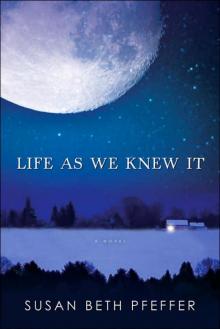 Last Survivors 01 - Life as We Knew It
Last Survivors 01 - Life as We Knew It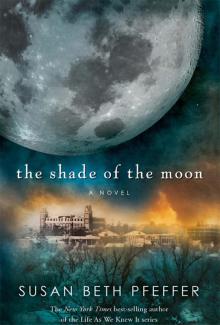 Last Survivors 04: Shade of the Moon
Last Survivors 04: Shade of the Moon Thea at Sixteen
Thea at Sixteen Kid Power
Kid Power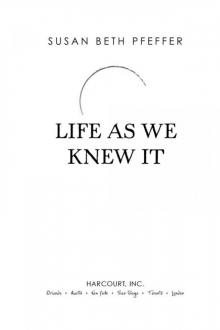 Life as We Knew It
Life as We Knew It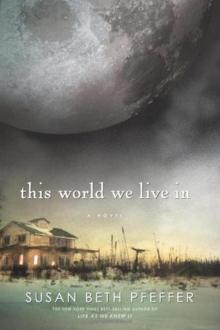 This World We Live In
This World We Live In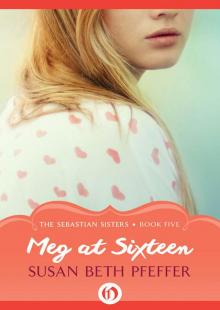 Meg at Sixteen
Meg at Sixteen Blood Wounds
Blood Wounds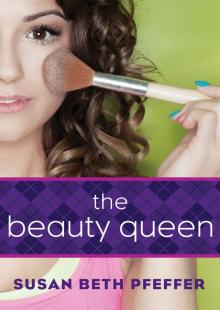 The Beauty Queen
The Beauty Queen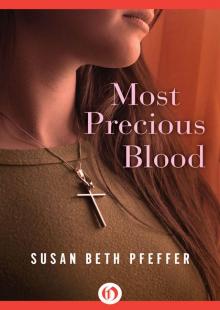 Most Precious Blood
Most Precious Blood The Dead and the Gone
The Dead and the Gone Sybil at Sixteen
Sybil at Sixteen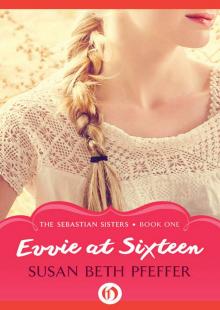 Evvie at Sixteen
Evvie at Sixteen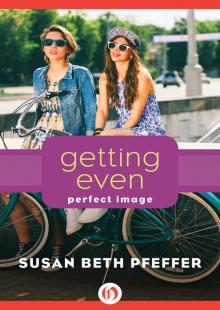 Getting Even
Getting Even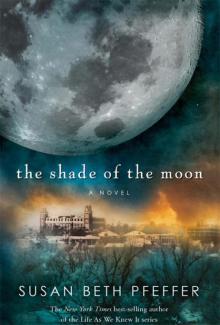 Shade of the Moon ls-4
Shade of the Moon ls-4 The Dead and Gone
The Dead and Gone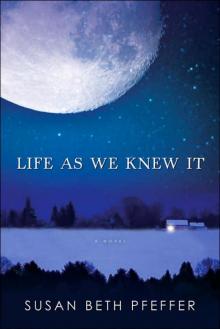 Life As We Knew It lawki-1
Life As We Knew It lawki-1 Fantasy Summer
Fantasy Summer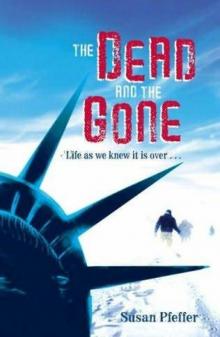 The Dead and the Gone ls-2
The Dead and the Gone ls-2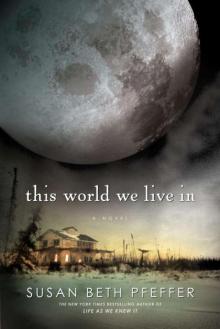 This World We Live In ls-3
This World We Live In ls-3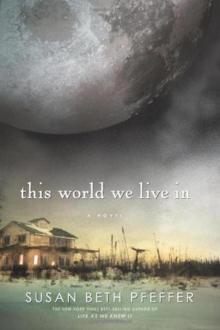 This World We Live In (The Last Survivors, Book 3)
This World We Live In (The Last Survivors, Book 3)